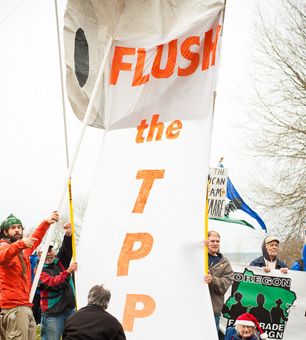Support justice-driven, accurate and transparent news — make a quick donation to Truthout today!
A super-sized NAFTA, the TPP gives foreign corporations privileges that can override domestic laws on environmental health and citizens’ rights. Here’s why we shouldn’t let it pass without a fight.
NHK Broadcasting, Japan’s equivalent of the BBC, contacted me last month, wanting a statement on the American public’s reaction to the TransPacific Partnership (TPP) negotiations.
A super-sized NAFTA, the TransPacific Partnership is a free-trade agreement whereby countries give foreign corporations rights and privileges to encourage investment and global business. The TPP was a major issue during Japan’s recent national elections, when thousands took to the streets in protest. It was hard for the Japanese journalist to believe me when I explained that there is little awareness of the TPP here in the United States, because our media has hardly covered the subject.
The corporate powers granted in the TPP can override domestic laws on environmental health and safety, and labor and citizens’ rights. Not only that, but multinationals can claim that those domestic laws hamper free trade and sue member countries for millions of dollars. The TPP is in many ways an attempt to revive the stalled expansion of the World Trade Organization.
At present, the TPP talks include 12 Pacific Rim countries: Canada, the United States, Mexico, Peru, Chile, New Zealand, Australia, Singapore, Malaysia, Brunei, Vietnam and, most recently, Japan. Thailand and the Philippines have expressed interest, and other countries would be allowed to join the TPP at any time.
Although trade deals have potentially huge effects on the economy, environment, and food sovereignty of communities throughout these 12 countries, the TPP negotiations are being held in secret between unelected government officials and representatives from more than 600 of the world’s most powerful corporations. The United States has plenty of interests clamoring for the trade advantages of the TPP, while developing countries like Vietnam see the TPP as an opportunity for economic development.
But the AFL-CIO, one of the few non-corporate and nongovernmental entities that have access to the text of the agreements, does not support the TPP in its current form because of implications for labor and human rights.
The talks are scheduled to finish by October of this year. Meanwhile, negotiators are lobbying Congress to grant “Fast Track” authority for the TPP. That would mean Congress couldn’t revise the agreements and could only vote “yes” or “no” to the United States joining the TPP.
Leaked documents show how extensive the reach of the TPP would be. It is shaping up as a corporate takeover of public policy that would impact safe food, sustainable jobs, clean water and air, access to life-saving medicines, education, even our very democracy. After 20 years under NAFTA we know the likely impacts for people and the environment.
In March, Citizens Trade Campaign organized a letter to Congress signed by 400 U.S. organizations outlining expectations for public involvement and calling for an end to Fast Track. It was signed by, among others, the Sierra Club, Doctors Without Borders, Public Citizen, the National Family Farm Coalition, and state trade justice groups including my organization, the Washington Fair Trade Coalition. Polls show the majority of Americans believe that offshoring jobs and NAFTA-style free trade deals have hurt the U.S. economy, so it’s likely that Americans would be opposed to the TPP too—if they knew more about it.
The next round of TPP talks will be held May 15–24 in Lima, Peru. An International Day of Action Against the TPP is set for May 11, International Fair Trade Day. TPPx-Border, a network of groups in the United States, Canada, and Mexico resisting the TPP, is organizing actions throughout the month of May and beyond, including webinars with Peruvian activists, a TPP action camp, and local community events. Visit TPPxBorder.org to find out how the TPP will impact you—and then take to the streets!
Press freedom is under attack
As Trump cracks down on political speech, independent media is increasingly necessary.
Truthout produces reporting you won’t see in the mainstream: journalism from the frontlines of global conflict, interviews with grassroots movement leaders, high-quality legal analysis and more.
Our work is possible thanks to reader support. Help Truthout catalyze change and social justice — make a tax-deductible monthly or one-time donation today.
